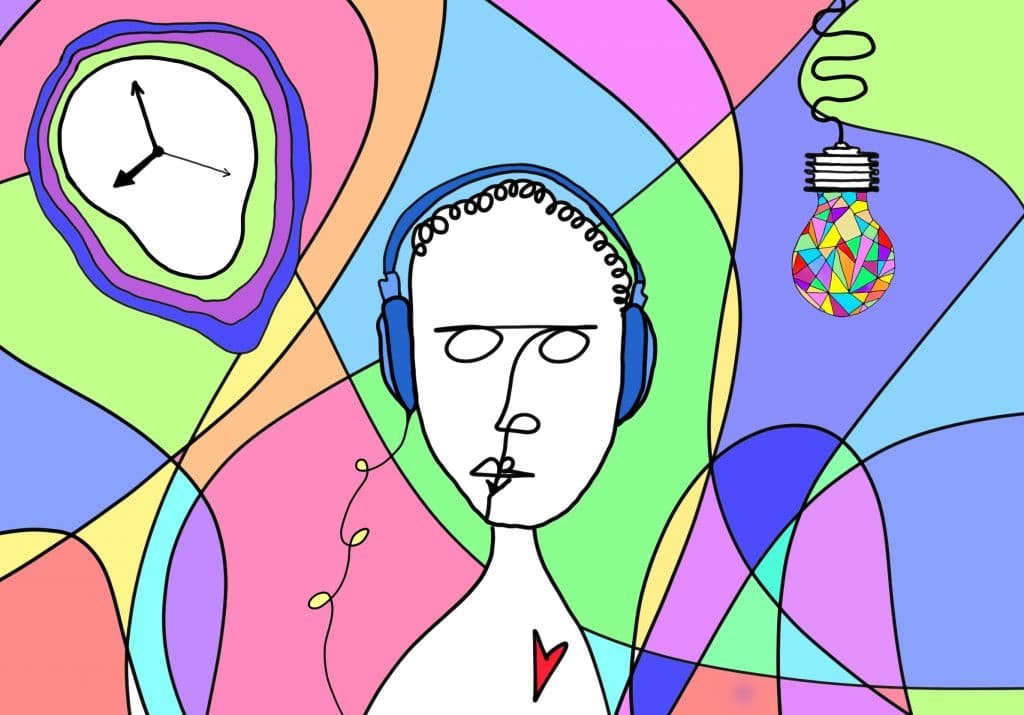PODCASTING: A LONG-TERM PHENOMENON OR A PASSING FAD? WHAT IT MEANS AND REVEALS
Text by Laetitia Sweeney

Illustration by Parker Le Bras-Brown
If I gave you a 10-page written article to read, you would probably be thinking it is too long and you would never end up reading it through entirely. But what if it was read to you out loud and at the same time, you could get to cook, work out, or drive to work? Imagine a relaxing and soothing voice, enticing you to hang on to every word. Let’s be honest, the latter option is far more appealing. Well, that is exactly what podcasts offer today, and they are more popular than ever.
Have you noticed this new trend? Podcasts are all around us! I started listening to some to fall asleep more quickly, or as a way to stop overthinking. I wasn’t the only one, my friends and neighbours were also starting to listen to podcasts. During holidays, we would just lie down, by the sun, listen to some occasional story of a thief or of lawyers defending the ‘bad guys’ or of a prisoner in his cell… Nowadays, podcasts are a common source of entertainment and have become a mainstream medium. This industry keeps growing each year and there are many reasons that have come together to attain “podcasts’ golden age”. It may seem like I am overdoing it but this term is pretty significant and representative of the occurring phenomenon. But let’s think about it more deeply: Why are they so popular? Why is it working so well? It is a long-term phenomenon or simply a short-term fad? And what does it reveal or what does it say when it comes to society generally?
For some background, we can owe the invention of podcasting to Adam Curry and Dave Winder, who both devised a plan to download online radio broadcasts from the Internet to Apple’s new devices. The term “podcasting” itself was first coined in 2004 by Ben Hammerly, a journalist for The Guardian in his article about the audible revolution and how radio is blooming thanks to iPods, cheap, audio software, weblogs (*link below if interested). The industry continued to grow in the early 2000s along with the rise of portable audio devices such as iPod, MP3 files and smartphones. And all of this takes us to our current era in which the podcast format has become incredibly popular, as much in consumption as in production.
The obvious explanation for this increase in consumption is simply its practicality. In fact, the format allows us to multitask, to dive into any topics without having to be alone in a quiet room, set aside in time. We have the liberty of choosing time and place. This main feature goes along with our new habits which consist of having what we want, wherever, whenever – you have a pizza craving, no worries it will be delivered in 15 minutes to your doorstep; you want to know how to fix your watch, Siri or Alexa are here to help you immediately. You get it, we are used to having access to anything in a very short time. Well, podcasts function the same way, meeting up with our specific needs. You want to listen to half of it in the subway, and the other half later on at home while cooking? It is not a problem. Ultimately, podcasts are very convenient, easy to consume and it is a time filler. They fit into our busy lives and touch on various topics in many forms. We can walk around and easily listen to any kind of podcast given our mood of the day.
All of this is happening in such a way that information flows everywhere and is bountiful. Information surrounds us, there is so much to see, to read, to watch and to learn. It is on our smartphones, on the radio, in ads, on our computer. We are never really used to being alone, we always do many things at the same time, we have this need for multiple stimulations – people do their homework and watch TV at the same time, or others read with classical music in the background. It agrees with the concept of ‘hyper attention’, developed by Hayles**:“It is characterized by switching focus rapidly among different tasks, preferring multiple information streams, seeking a high level of stimulation, and having a low tolerance for boredom.” . Similarly, with podcasts our bodies feel occupied. They embody information, occupation and entertainment at the same time. We are in the midst of a generational shift; we engage differently with information. We no longer take time to read a long article but we prefer to listen to a long article, in bite-sized chunks during our commute to work. In that way, podcasts tell stories in an inventive way, using a medium easy to connect with, including stories you do not find elsewhere. Their format allows a deeper dive into many subjects. And of course, they are, for the vast majority, free of charge. They can be educational, entertaining, inspirational, funny, intimate, free, easily accessible to anyone. And all of these characteristics answer our needs in our digital society with generations growing up in a media-rich environment. All of this makes me think and question how the media environment shapes the way we process things, how information moves and how our attention ebbs and flows.
The production side of podcasting is also increasingly crowd-pleasing: producing podcasts can be done very easily for very little cost. It is a flexible format allowing anyone to try new things, which appears as a news platform and a wide territory to expose one’s creativity and ideas. You, as a creator of a podcast show, can talk about anything you like in the format you wish – whether it is talking about conspiracy theories of flat earthers in the form of an investigation, or discussing the origins of the Black Lives Matter movement in an interview with hip-hop artists from the Bronx. This new trend is observable around us: think of your friends who have thought of creating their own podcast show. Even at universities, more and more professors consider the podcast format instead of a written format for final projects. Podcast production is cheap, simple, easy to manage as there are no visual aspects and attractive. It is easy for most people who want to do it to just give it a go, there is nothing to lose. On the other side, good shows can find a large audience.
Podcasts’ features reflect how our society functions today, making connection between the medium, its meanings and society’s habits anchored in our digital, mediated and busy world.
But what do you think of the future of podcasting? Where do you think it will go from here? Do you think the golden age of podcasting will perpetuate or will come to an abrupt end? It is hard to tell: maybe this success will recede, or maybe at some point, there will be too much of them and we will get bored or lose our ability to innovate and to trigger the audience’s curiosity; or maybe it is the role model for the future of society.

